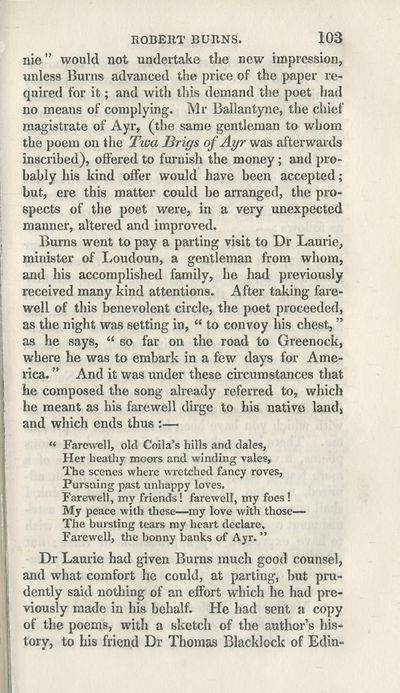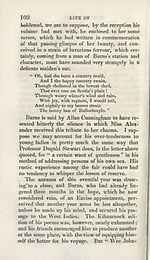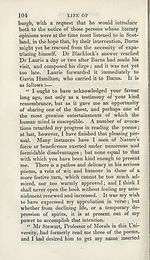Scotland/Scots > Life of Robert Burns
(113)
Download files
Complete book:
Individual page:
Thumbnail gallery: Grid view | List view

ROBERT BURNS. 103
nie” would not undertake the new impression,
unless Burns advanced the price of the paper re¬
quired for it; and with this demand the poet had
no means of complying. Mr Ballantyne, the chief
magistrate of Ayr, (the same gentleman to whom
the poem on the Twa Brigs of Ayr was afterwards
inscribed), offered to furnish the money; and pro¬
bably his kind offer would have been accepted;
but, ere this matter could be arranged, the pro¬
spects of the poet were, in a very unexpected
manner, altered and improved.
Burns went to pay a parting visit to Dr Laurie,
minister of Loudoun, a gentleman from whom,
and his accomplished family, he had previously
received many kind attentions. After taking fare¬
well of this benevolent circle, the poet proceeded,
as the night was setting in, “ to convoy his chest, ”
as he says, “ so far on the road to Greenock,
where he was to embark in a few days for Ame¬
rica. ” And it was under these circumstances that
he composed the song already referred to, which
he meant as his farewell dirge to his native land,
and which ends thus :—
“ Farewell, old Coila’s hills and dales.
Her heathy moors and winding vales.
The scenes where wretched fancy roves.
Pursuing past unhappy loves.
Farewell, my friends! farewell, my foes!
My peace with these—my love with those—
The bursting tears my heart declare.
Farewell, the bonny banks of Ayr. ”
Dr Laurie had given Burns much good counsel,
and what comfort he could, at parting, but pru¬
dently said nothing of an effort which he had pre¬
viously made in his behalf. He had sent a copy
of the poems, with a sketch of the author’s his¬
tory, to his friend Dr Thomas Blacklock of Edin-
nie” would not undertake the new impression,
unless Burns advanced the price of the paper re¬
quired for it; and with this demand the poet had
no means of complying. Mr Ballantyne, the chief
magistrate of Ayr, (the same gentleman to whom
the poem on the Twa Brigs of Ayr was afterwards
inscribed), offered to furnish the money; and pro¬
bably his kind offer would have been accepted;
but, ere this matter could be arranged, the pro¬
spects of the poet were, in a very unexpected
manner, altered and improved.
Burns went to pay a parting visit to Dr Laurie,
minister of Loudoun, a gentleman from whom,
and his accomplished family, he had previously
received many kind attentions. After taking fare¬
well of this benevolent circle, the poet proceeded,
as the night was setting in, “ to convoy his chest, ”
as he says, “ so far on the road to Greenock,
where he was to embark in a few days for Ame¬
rica. ” And it was under these circumstances that
he composed the song already referred to, which
he meant as his farewell dirge to his native land,
and which ends thus :—
“ Farewell, old Coila’s hills and dales.
Her heathy moors and winding vales.
The scenes where wretched fancy roves.
Pursuing past unhappy loves.
Farewell, my friends! farewell, my foes!
My peace with these—my love with those—
The bursting tears my heart declare.
Farewell, the bonny banks of Ayr. ”
Dr Laurie had given Burns much good counsel,
and what comfort he could, at parting, but pru¬
dently said nothing of an effort which he had pre¬
viously made in his behalf. He had sent a copy
of the poems, with a sketch of the author’s his¬
tory, to his friend Dr Thomas Blacklock of Edin-
Set display mode to:
![]() Universal Viewer |
Universal Viewer | ![]() Mirador |
Large image | Transcription
Mirador |
Large image | Transcription
| Antiquarian books of Scotland > Scotland/Scots > Life of Robert Burns > (113) |
|---|
| Permanent URL | https://digital.nls.uk/108247215 |
|---|
| Description | Thousands of printed books from the Antiquarian Books of Scotland collection which dates from 1641 to the 1980s. The collection consists of 14,800 books which were published in Scotland or have a Scottish connection, e.g. through the author, printer or owner. Subjects covered include sport, education, diseases, adventure, occupations, Jacobites, politics and religion. Among the 29 languages represented are English, Gaelic, Italian, French, Russian and Swedish. |
|---|

